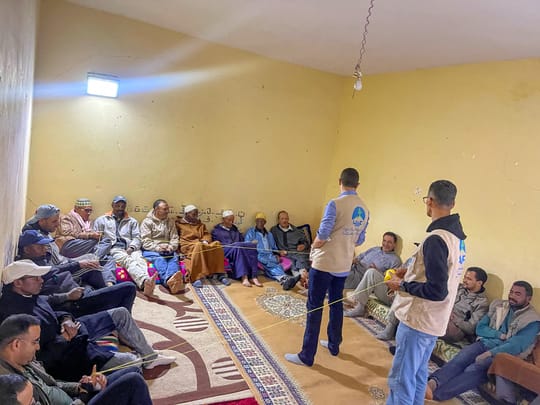Facilitating Men's Emotional Recovery Post-Earthquake

One year on from the earthquake, I have heard many stories and witnessed many acts of resilience from all members of the community, however, particularly men. Despite losing their loved ones, homes and livelihoods, they have remained strong, often not publicly revealing their inner feelings of fear or sadness.
Listening to people, to understand how they are feeling and to assess their needs, and determine how to help them, was key in my role as program assistant. As we mark the anniversary of the earthquake I reflect on my time spent with these communities.
A particular highlight was my time with the men of Taboughamte village, within the Telouate municipality of the Ouarzazate province. On May 15, 2024 I joined the Psychosocial Empowerment Workshop held in the village. I spent three days listening to and working with these men, to address the devastating impacts of the earthquake, and empowering them to build back better.
The Psychosocial Empowerment Program, delivers group-based psychosocial support to earthquake affected communities. Whilst originally targeting only women and children, the program was expanded to include men.
Men culturally and socially are often expected to appear strong and resilient, but they are still human beings who need someone to listen to them and help them overcome the trauma of such loss. It is not easy to lose your loved ones and home.
On our way to Telouate, we saw a turtle crossing the road. We stopped the car to save it from the traffic and decided to bring it with us on our journey. We named it Hope, inspired by Project HOPE, whose ongoing support enabled this workshop.
Once we arrived at the hotel, we met as a group, with Mr. Abdellah, HAF facilitator, explaining our purpose and mission, before heading to Taboughamte village.
The workshop was scheduled in the evening to accommodate the men's work, including the rebuilding of their homes that were damaged or destroyed by the earthquake. The men warmly welcomed us, and expressed gratitude for HAF and its relief efforts.
On the first evening, our goal was to create a trusting relationship between the participants and HAF facilitators, and create a comfortable environment. To build this trust and get to know each participant better, we asked them their names and their favorite foods.
We listened to their stories about the earthquake. Interestingly, many of them described the earthquake as a miracle. During the session, we delved into the depths of emotional recovery. It became evident how crucial it is to address and heal the wounds of the heart.
Many of the men shared their experiences and vulnerabilities for the first time, creating a powerful sense of connection and mutual understanding within the group. This openness was a significant step towards their emotional recovery, showing that acknowledging and expressing one's feelings is a vital part of the healing process.
A moment that will stay with me for a long time, and one that made many in the room laugh was when one man recounted the birth of his son,
“My wife gave birth to my son at the exact moment the earthquake hit. When the earthquake went boom, my wife went boom, and out came my son and I named him (Mbarek) which means (the blessing child)”.
On the second evening, we began by recalling the previous evening sessions. The men answered very well, remembering each detail. This evening, we played the string game. The game is played like this: one person starts by choosing someone from the group and saying something they love, appreciate or admire about them.
Once finished, they pass the rope to the next person, until the whole group is linked by the rope and everyone has expressed appreciation for another. During this game, the men were very open in expressing their appreciation and their good feelings towards each other, as described by Abdo, who said,
"It's a simple thing, but it's the first time I feel appreciated and realize how much I love these united values from my community”.
The third and final evening was full of emotions and feelings. The men arrived with smiles on their faces, excited for the session. We reminded them about the positive values and practices that contribute to good mental health and how these can help them better cope moving forward.
For men, it's true that they often demonstrate remarkable resilience in difficult situations. However, it is equally important to recognize that they sometimes need someone to listen to them and provide support.
The psychosocial workshop was not only life-changing for the participants but also for me. Witnessing the transformation in these men was truly inspiring. In the end, the workshop did more than just offer temporary relief; it laid the foundation for lasting emotional healing and expression - key to the long-term wellbeing of these men.
It demonstrated that with the right support and understanding, even the most deeply injured hearts can begin to heal. This experience reinforced my belief in the power of empathy and the profound impact that genuine listening and support can have on an individual's life.